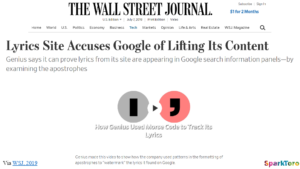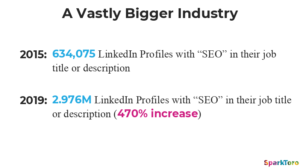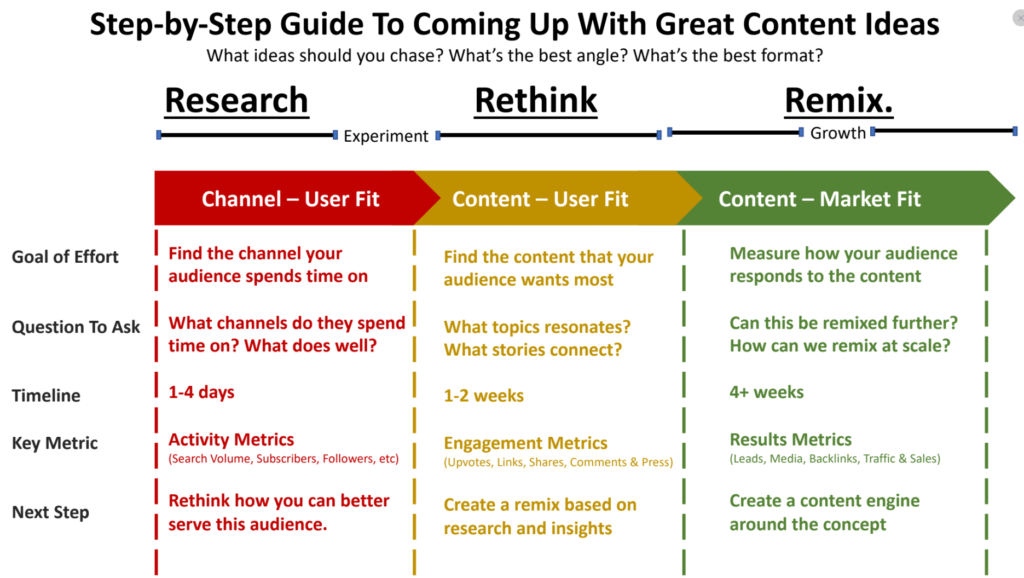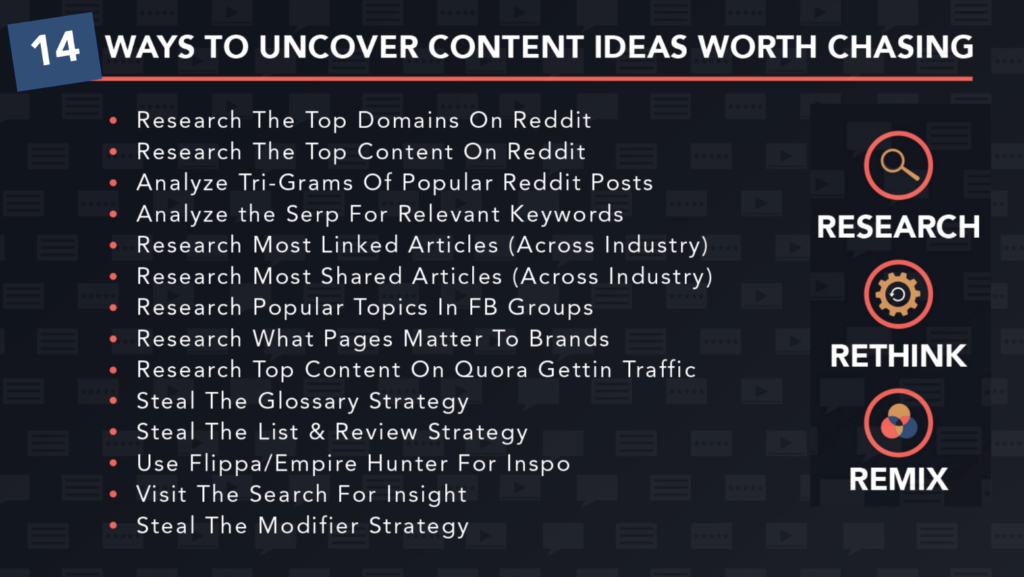What You Missed at MozCon 2019 | Day 1
If you didn’t have the chance to attend MozCon 2019 in Seattle, then you missed out on a wealth of knowledge. The conference covered every aspect of digital marketing with never a dull moment. I’m Mike Marsh, the SEO specialist for the Boostability marketing team, and I’m going to fill you in on what you missed, speaker by speaker.
My first day at MozCon was a great experience where I learned to optimize for the zero-click results page, how to address ranking locally, how to optimize our content with data from quality reports, and why being ethical with our work is so important. The idea of trying to look like the best rather than being the best purely for SEO benefit can be applied in every aspect of what I do. We here at Boostability don’t pretend to be the best—we are known worldwide to be the leader in white label marketing and get results for our clients. It’s encouraging to see so many speakers from different aspects of the SEO realm that reaffirm the strategies that we offer our white label partners and businesses.
Welcome to MozCon 2019 | Sarah Bird
“We are in a golden age of search,” said Sarah Bird at MozCon’s opening remarks. Search experience has expanded exponentially and has become more refined than ever before. Google wants to keep you with them rather than sending you to a different site. Conversion rate optimization can be found right there on the SERP as opposed to directing users to your site. Because of these changes, there needs to be a new mindset going forward.
“Because Google wants to answer searchers’ questions as quickly as possible, they’ve moved from being the gateway to information to being the destination for information in many cases. SEOs need to be able to work smarter and identify the best opportunities in this new landscape.” – Kameron Jenkins
Web Search 2019: The Essential Data Marketers Need | Rand Fishkin
To see Fishkin’s presentation, click here.
DON’T make big investment in voice search. This doesn’t mean you should ignore the fact that it exists, but it’s is too early to spend large amounts of your budget on this aspect of search. Also, mobile apps are not worth the time for marketers, as their ROI is so volatile.
DO make investments in web-based video, podcasts, and websites as all of these mediums are great investments for you and your clients. Organic traffic versus paid traffic is getting closer than ever in the click category. It used to be 25:1 but is now 11:1.
Zero-click search results are extremely important for your brand, but they don’t draw a lot of traffic to your website. Google is answering the search query right in their SERP. If your clients or team recognize that its your brand that is answering frequently-asked questions, then it can be very good. An FAQ page with schema markup is one way to ensure you are asking (and answering) the questions you want your potential client to see.
Many of the Google updates that have taken place in 2019 are ones that have been pushing away misinformation. Authority is being used more than ever before, especially in tragedy searches and conspiracy theories or misinformation. Flat earth, vaccines, and the Sandy Hook tragedy are examples of how Google has used their E-A-T algorithm to help push these misguided results out. If the wrong answer is dangerous, then Google is modifying algorithm to make sure that these inaccuracies don’t show up. As a result, accurate information and comprehensiveness is on the rise for ranking on SERPS.
Even though Google is doing all this to make the web a safer place, they are by no means your friend. They have been caught scraping sites for data and posting as their own without attribution.

In cases like the Genius lyric copying fiasco, Google is causing businesses harm and the press is your ally. Getting the word out to the press helped Genius get attention to this issue quickly and Google responded by attributing all lyrics that show up in their SERPs quickly.
The professional SEO landscape is bigger than it ever has been. More and more people are choosing this career path and the future only shows more growth.

With the industry growing as large as it is, staying on top of current trends is essential. Here are some of the key takeaways that Rand has for the Future of SEO:
- Less trackable marketing stats – On SERP SEO and 0 CLICK RESULTS
- Digital Marketing is a bigger industry than it used to be. More competition.
- Shift in searches. Organic search is lower than in the past.
Thinking of how your brand can compete even without a click is the next step in Google’s SERPS.
Understanding Human-Readable Quality Signals and Their Machine-Readable Equivalents | Ruth Burr Reedy
To see Reedy’s presentation, click here.
How can I demonstrate quality that make sense for both humans and machines?
Optimizing for machine readability and human readability have a lot in common. Being clear, concise, accurate, and authoritative, avoiding jargon, and covering subtopics are the most important steps to take when optimizing for machine-readability. Putting the answer right next to the question can help guide the crawlers and make it easier for your reader to get their answers, too.
Google’s Natural Language API Test can help you see what machines think of your content.
Don’t chase the algorithm. If you are looking at the algorithm updates, you are only finding what Google just did and not what they’re are going to do. Don’t be reactive—you need to look at the why of the algorithm updates and learn from them. A couple of key points:
- Optimizing for the robot is too reactive.
- Optimizing for the human is too inefficient.
- You have to create a strategy that combines the two to succeed in the long run.
It’s not always possible to get traffic back that you’ve lost. You can get other traffic from new sources, but the old stuff may be gone for good. It’s not that you’re penalized; it may mean that what people want has changed and Google’s algorithm recognizes that. Reading through Google’s Quality Rater Guidelines can help you predict what updates may come next and content quality.
Improved Reporting & Analytics Within Google Tools | Dana DiTomaso
To see DiTomaso’s presentation, click here. To see her charts, click here.
Dana gave some great ideas on how to make the most of SEO reporting. Start by visualizing some of the most basic tools and considering them like this:

- Tag Manager is the factory.
- Analytics is the warehouse.
- Data Studio is the showroom.
Creating a plan before you build out your reporting is essential to not wasting time and resources. Your time could be better spent on answering questions that matter to you and your clients. Just like coding, you should annotate your analytics setup so you’re explaining the why behind the setup. If you’re showing how the tools tie together, then the next person to come along and look at your setup will thank you.
Use Google’s Data Studio to showcase your reports and data. The right graph element is apparent when:
- You can tell at a glance if you’re on the right path.
- You don’t have to be there to explain the report.
- The report can be used for years to come.
Good reports answer a question. Make sure that you aren’t overloading the reader with too much data and that you are only answering one or a few questions per page. By making your reports more accessible, you make the data stand out.
Local Market Analytics: The Challenges and Opportunities | Rob Bucci
To see Bucci’s presentation, click here.
Optimizing your business to rank better for a local audience is a strategy separate and loaded with its own rules. Because of this, shouldn’t it have it’s own analytics? Rob helps us understand that the future of SERP Analytics is taking a more Local approach. Using the data correctly can help you get some amazing insights.
#MozCon Google says localization is the greatest form of personalization. Even if your business model is digital, your competitors are local. Enter: #LocalMarketAnalytics: https://t.co/pbPsE6ofXo
— Miriam Ellis (@Miriam_Ellis_) July 15, 2019
People are using local search intent in their everyday queries and Google is working hard to provide them with answers. In order for businesses to thrive, they need to be visible for the ways customers are searching for them. Optimizing for local is the way to go. A few stats Bucci outlined:
- 73% of the 1.2 million SERPs analyzed contained a localized feature.
- 25% of the sites tracked had some degree of variability across US markets.
- 85% was the maximum variability seen across zip codes in a single market.
What this showed was that SERPs change depending on where the search was coming from, even for queries without high local intent. 68% was the variability for two similar queries in the same market.
You have to be intentional about which specific combinations of query and location you want to optimize for. Tweaking either variable results in a different SERP. In this research done, local three-packs were seen to be more variable than the organic results.
Moz is creating a tool to help local tracking of multiple zip-codes at once. To get an invite, go here: Mz.cm/LMA2019
Keywords Aren’t Enough: How to Uncover Content Ideas Worth Chasing | Ross Simmonds
To see Simmonds’s presentation, click here.
When coming up for ideas on what content to create Ross gives us a methodology to follow:
- Research – Understand the audience you’re trying to connect with by studying the channels they’re visiting. Understand the channels you’re using by studying the way content is being received by users.
- Rethink – Let the discovery process take you. Visit online communities, browse groups, reverse engineer backlinks, and look at the SERPs. Now rethink the way you deliver content to your audience and the content itself.
- Remix – Don’t just steal ideas. That’s a one way street to the average of the means. Instead remix the content you know will work and ensure that the content you create is better than what exists today.
If you are creating something that is better for users, then you will not need to worry about ranking, Google will give you what you deserve.

Ross gives us the step-by-step guide on how we can be coming up with great content ideas. This process of ideation and creation can be so hard to nail down effectively, but his guide helps those in content marketing with a framework on how to tackle this problem.

When taking into account what types of content ideas you should be chasing, consider the ROI, circle of competence, cost/time to create, and the shareability/linkability/rankability/competition.
How to Supercharge Link Building with a Digital PR Newsroom | Shannon McGuirk
To see McGuirk’s presentation, click here. To read her blog post, click here.
Shannon McGuirk from Airer talks us through her best link building tips and strategies..
"This is how link building should be done in 2019"#mozcon #mozcon2019 pic.twitter.com/Tme8aJP1mP
— MacNaught Digital (@MacNaughtSEO) July 15, 2019
By focusing on three different types of editorial pieces, you can optimize your PR outreach and linkbuilding potential. The types of editorials that you should consider for your campaign are:
- Reactive Editorials – Written in the here and now that are unplanned and can’t be predicted.
- Planned Reactive Editorials – Written by journalists on a topic that ties to a seasonal event or theme that we know is being covered due to time frame, but we don’t know the exact story until editors or journalists write it on the morning of their editorial meeting.
- Planned Editorials – Written months in advance by writers because they know within a given time frame they have to write about the topic, and they’re just waiting for the final components of their feature to be revealed so they can hit publish.
To help facilitate these types of editorials you will need to setup a Digital PR Newsroom. This includes making sure you have the planning, resources and people to succeed.
From Zero to Local Ranking Hero | Darren Shaw
To see Shaw’s presentation, click here.
Darren gave us a walkthrough of how he and Whitespark helped a small business get their local campaign off the ground from Zero to Hero. The small business literally had no presence on the web, and so his team wanted to track the activity and monitor the effects throughout.
Setting up the Google My Business page and utilizing all the features for engagement signals and conversions that it offers is the first step to start ranking locally. You need to tell Google what they need to know about your business.
To get a better sense of actual rankings, track from different locations around the city. During this process, the citations built for the website didn’t help rankings but that could be because they weren’t getting indexed by Google. He used GSC to request an indexation of the citation links and saw an increase in rankings immediately.
Adding a service area with multiple zip codes also helped. They also started a linkbuilding campaign, and while they saw great returns initially, there were diminishing returns on their campaign as they reached parity with the competition.
The top takeaways he got from his campaign were:
- Don’t just track local rankings from the city center. Track from multiple zip codes around the city.
- To get the full value from your business citations, ensure they’re indexed.
- The service area section in GMB will not help you rank in those areas.
- Invest in a Google review strategy. They have an impact.
- Linkbuilding campaigns work but monitor them closely.
- Any individual strategy will eventually hit a point of diminishing returns.
- A full website is better than a GMB single-pager.
It’s not one specific activity, it’s the aggregate of all activities that will move the needle.
Esse Quam Videri: When Faking it is Harder than Making It | Russ Jones
Finding shortcuts to get around problems in a new, inventive way is a skill. @rjonesx pointing out the tough truth to some marketing tactics. Just make your site more relevant!#MozCon #BoostatMozCon pic.twitter.com/BVpm4aRVeo
— Boostability (@Boostability) July 15, 2019
If you look at your SEO tactics, your goal is probably to convince Google that your site is more relevant and important rather than to actually make your content more relevant and important. Weas SEOs can be clever, resourceful, and cut-throat while holding to a strict ethical standard.
Once you actually deserve to rank and are the best rather than pretend to be the best, your linkbuilding will be far more successful.
"Stop seeming, start being. Don't pretend that your content is the best. Make it the best so you KNOW it will rank." @rjonesx #MozCon #BoostatMozCon
— Boostability (@Boostability) July 15, 2019
- Qualify customers, make sure they’re on board with your vision
- Commit to tactics that improve the user experience until the page is the best
- Use tactics that promote agnostic user experiences after the content is the best
- Maybe this means changing the order of operations
- Content Thoroughness
- Accessibility
- Page Speed
Within the discipline of search engine optimization, the ROI of BEING the best query response is approaching the ROI of PRETENDING to be. The time when we will “Be rather than seem” marketers is quickly approaching.
Ask yourself, “Does this page deserve to rank?” If it doesn’t, make it!

